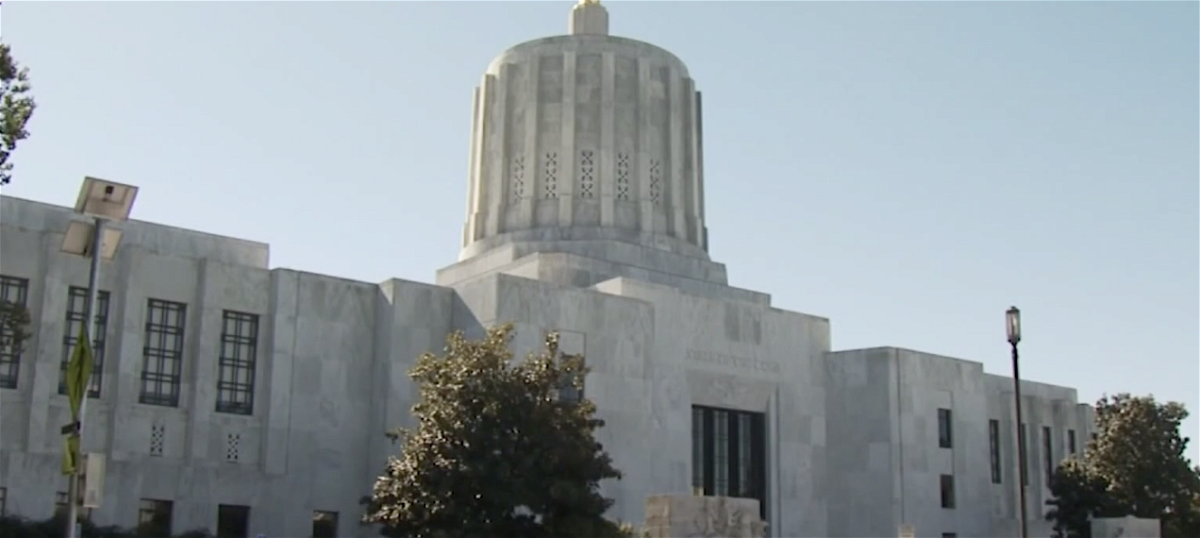Milestone on path to Measure 110 ‘fix’: Local governments, public safety officials endorse legislative amendments

Deschutes County DA Steve Gunnels, Crook County Sheriff John Gautney among those voicing support
SALEM, Ore. (KTVZ) -- With no time to spare in a "short" legislative session, a major step was cleared on a Measure 110 "fix" package Monday as Oregon cities, counties and law enforcement endorsed compromise legislation to recriminalize drug possession but also provide "deflection" programs to divert those charged to treatment programs, when appropriate.
Deschutes County District Attorney Steve Gunnels told NewsChannel 21: "I’m pleased with the progress that has been made on this bill. It provides a path to treatment and recovery for drug users and meaningful consequences for drug dealers."
Here is the full joint statement issued by the League of Oregon Cities, the Oregon Chiefs of Police, the Oregon District Attorneys Association, the Oregon State Sheriffs’ Association, the Oregon Coalition of Police and Sheriffs, and the Association of Oregon Counties:
Oregon’s public safety and local government leaders are pleased to endorse amendments to HB 4002 which align the state’s drug addiction policy with public sentiment and the input of police chiefs, officers, sheriffs, district attorneys and local governments.
The bill recognizes police and prosecutors have a role to play in interdicting the supply of narcotics and intervening to protect communities and people suffering from addiction.
Specifically, the -24 amendments will:
- Fix Boyd/Hubbell: The -24 amendments address adverse court rulings that have prevented the successful prosecutions of drug dealers.
- Provide Sentencing Enhancements for Dealing to Vulnerable Populations: The proposed language carries stiff sentences for dealers who sell near parks, treatment facilities and homeless shelters.
- Establishes a Special Unclassified Misdemeanor for Possession of a Controlled Substance (PCS): The draft proposal recriminalizes possession of a controlled substance that allows sanctions if a defendant fails diversion.
- Allows for Voluntary Local Deflection Programs: The legislation will provide funding for local communities to build deflection plans that will allow officers and prosecutors to divert people who could be charged with PCS toward pre-booking diversion programs when appropriate.
“As law enforcement leaders, we understand that addressing Oregon’s profound addiction and overdose crisis demands a comprehensive strategy, significant resources and real solutions,” said McMinnville Police Chief and Oregon Chiefs of Police President Matt Scales.
“We applaud the Legislature for working collaboratively to craft bipartisan legislation that combines vital tools for law enforcement with significant drug treatment resources to compassionately help those struggling with addiction. We believe this important legislation prioritizes the safety of our communities while offering real hope for those suffering with addiction.”
“This final package makes it clear that Oregon is not open for business to drug dealers,” said Umatilla County District Attorney and Oregon District Attorneys Association President Daniel Primus. “The new enhancements make clear that our parks, treatment facilities and shelters are safe places for families and vulnerable citizens seeking housing or treatment.
"It’s time we all hold the drug dealers that are profiting off our communities accountable. The bi-partisan amendment includes exactly what we’ve been asking for – clear, meaningful, and simple solutions to our drug crisis.”
“From the beginning of the conversation on Ballot Measure 110 reform, the Oregon State Sheriffs’ Association (OSSA) took a strong position on what it should look like,” said OSSA President and Crook County Sheriff John Gautney. “The draft language in the amendments is a result of a true partnership across both parties and the criminal justice system.
"Evidence has shown that drug addiction must be treated differently. This bill will provide the necessary funding to support those evidence-based diversion programs across the state. The OSSA supports this bill as it will provide the public safety the citizens of Oregon expect, and it will make a significant difference in the addiction crisis in our state.”
“City leaders are the elected officials closest to the public, and as such, I and my colleagues from around the state have heard loud and clear the desire for an effective, humane response to Oregon’s community safety and addiction crisis,” said Hermiston Mayor and League of Oregon Cities President Dr. David Drotzmann. “Preliminary CDC data tells us Oregon experienced a 41% increase in overdose deaths from last year - this comes as no surprise to mayors, city councilors, and city employees who see the tragedy unfolding on our streets.
"The amendments being considered by the Legislature allow cities to intervene to protect the health and safety of those suffering from addiction but in a way that moves towards recovery. We know this has been a complicated and difficult conversation and Oregon’s cities will continue to be a partner in building a healthier state.”
“Law enforcement has had a front row seat to the intractable crises of deadly drugs flooding our streets the last several years,” said Oregon Coalition of Police and Sheriffs President Aaron Schmautz. “Officers currently have too few tools to combat this crisis. Our communities are crying out for solutions. The compromise struck in HB 4002 is a good first step.
"It recognizes the need for accountability, options for cities and counties of varying size, and restores the ability for interdiction in cases involving distribution of a controlled substance. It is critical that we continue to work in partnership. Our legislative fixes must ensure that all treatment, law enforcement, and judicial systems are working together.”
"Counties know that Oregon’s drug policy must prioritize individuals’ ability to engage in substance abuse treatment, provide sufficient funding for county public health and public safety services, and provide adequate tools the criminal justice system can use to fight illegal drug use and sales,” said Marion County Commissioner and Association of Oregon Counties President Danielle Bethell. “The
-24 amendments attempt to strike a necessary balance, supporting and strengthening the behavioral health system while reestablishing law enforcement's critical role in tackling this crisis."